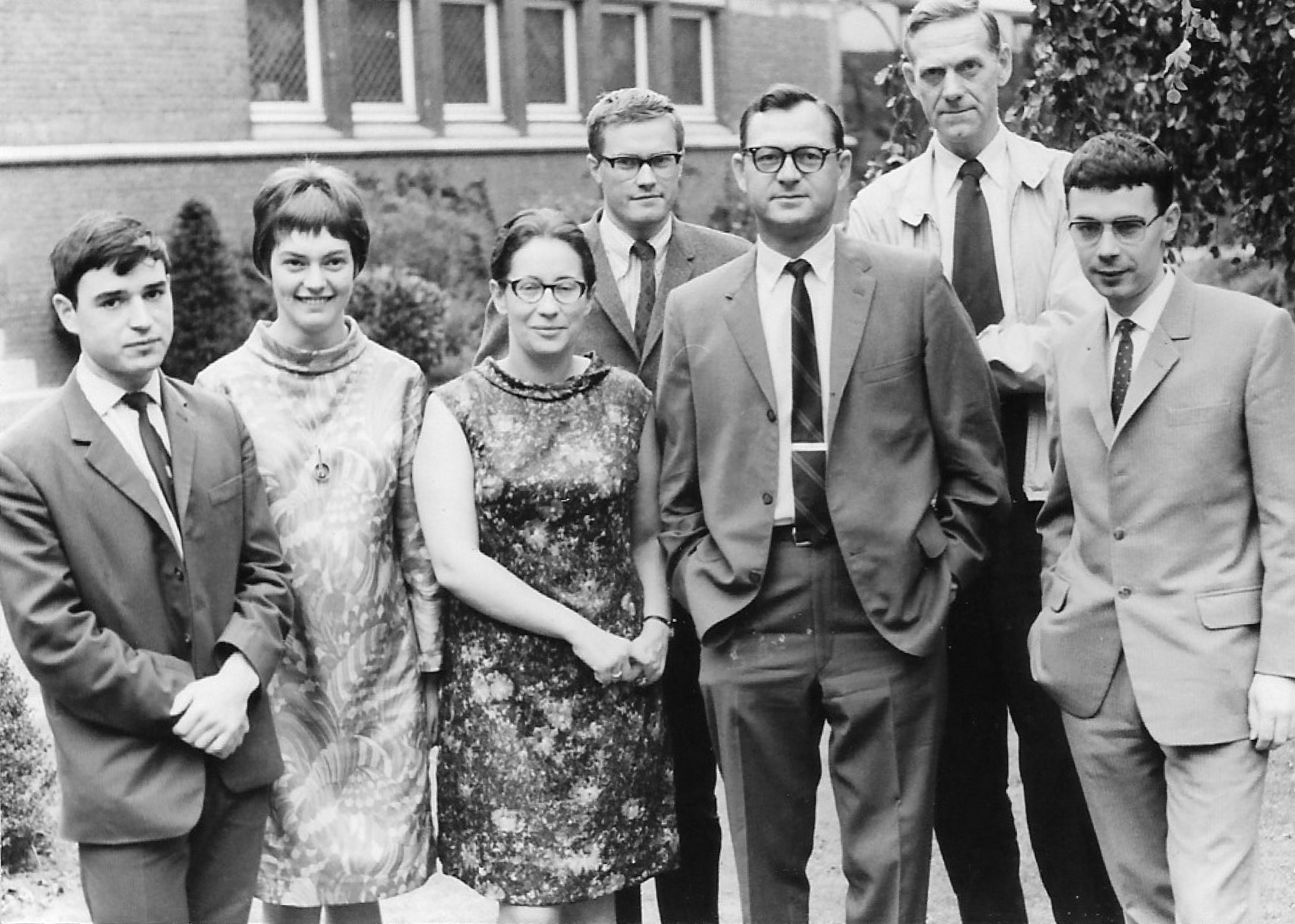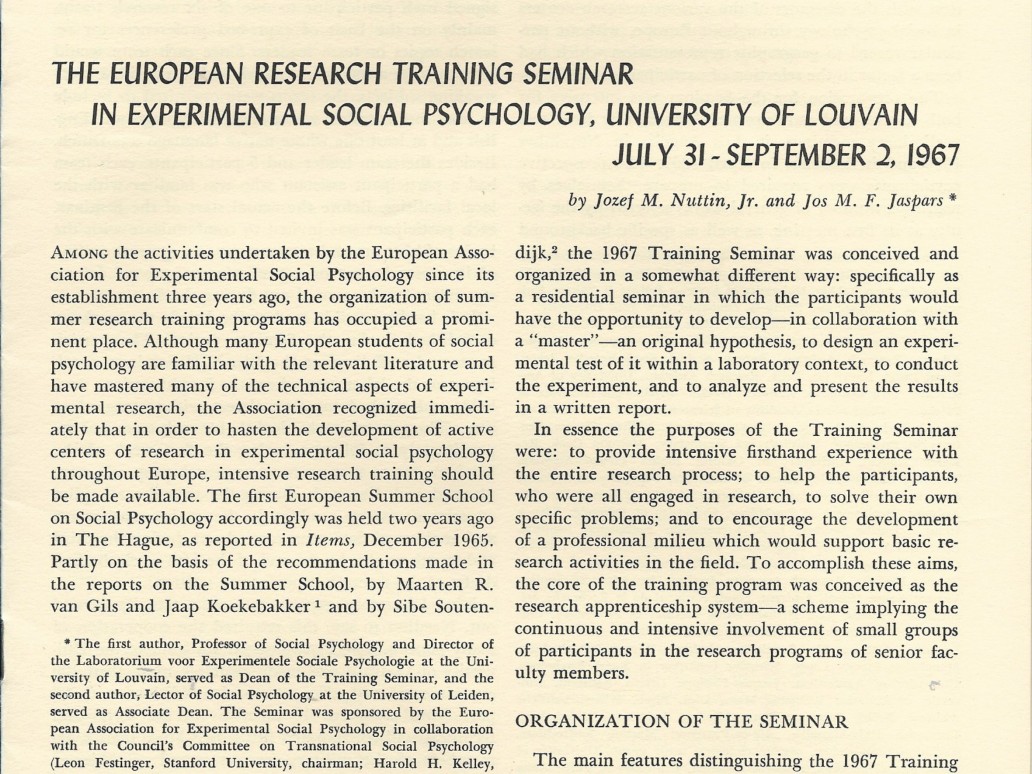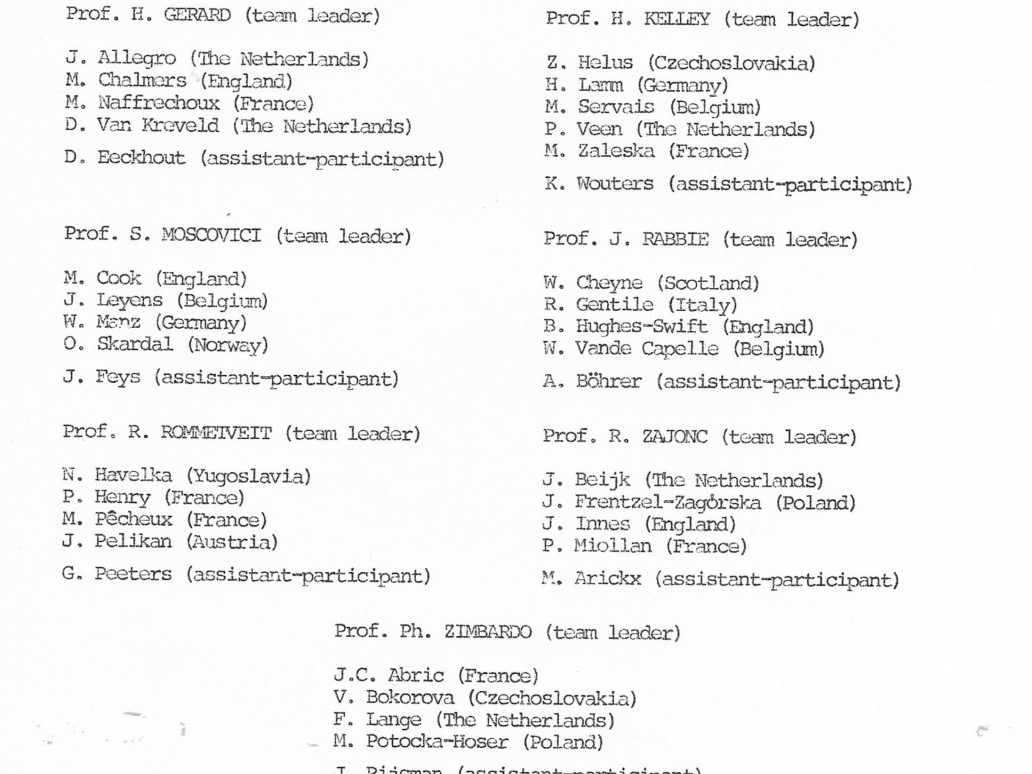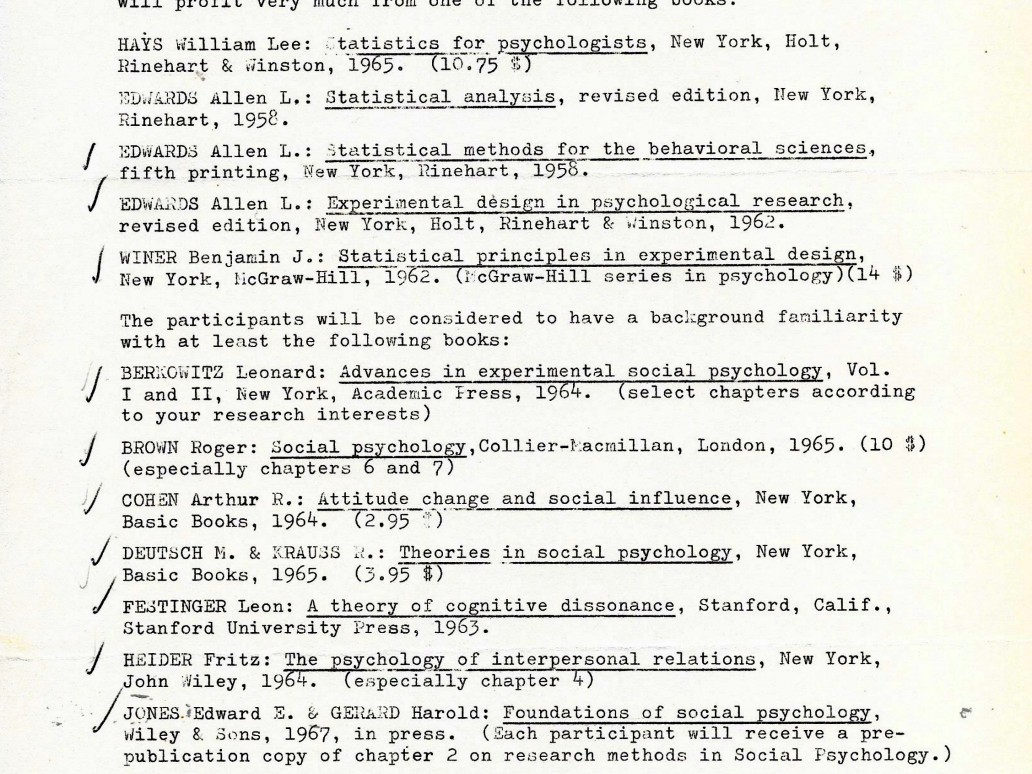Recollections of the 1967 Louvain Summer Institute
In their comprehensive account of the formation and development of the European Association of (Experimental) Social Psychology, Moscovici and Markova (2006) identify the "Louvain Summer Research Training Institute: 31 July – 2 September 1967" as "one of the most carefully planned and charismatic events to take place in the history of European social psychology" and refer to it through the eyes of the participants as "both personally and intellectually, as a most enriching experience" (pp.113-114). As a participant in the Summer Institute I cannot attest to the detail of planning that prepared for it, but I can record the experience as being probably the most significant single experience in my career as a social psychologist. It is now 54 years since the Institute took place in the Experimental Social Psychology Laboratory at the University of Louvain, but there are still clear and eidetic memories that remain.
I was a lecturer in social psychology at the University of Birmingham (England) when I learned of the upcoming Institute. Mel Manis of the University of Michigan was visiting the University of Utrecht and came to Birmingham as part of his European sojourn. He learned of our work at Birmingham (Colin Fraser, later to be a Secretary of the EAESP, was another social psychologist there at the time not long before he moved to Bristol to work in Henri Tajfel's department) operating within a Department of Psychology, within a Faculty of Science, with a Head of Department who was a behavioural geneticist, and surrounded by experimental psychologists of the basic school. Somehow Mel got my name forward to Josef Nuttin who was the Dean of the Institute and I was accepted as a late entry. I was teaching several courses of social psychology, but also courses in the practicals of experimental psychology and completing a PhD on language and the creative process. My social identity as a social psychologist was not fully formed. The Summer Institute completed that process of identification.

The Summer Institute brought together 30 participants from institutes all over Europe, augmented by six assistant graduate, participants from the University of Louvain. We were allocated to six research teams to be led by senior faculty. The six faculty members were Hal Gerard (University of Riverside, California), Hal Kelley (University of California, Los Angeles), Jaap Rabbie (Utrecht University), Ragnar Rommetveit (University of Oslo), Bob Zajonc (University of Michigan) and Phil Zimbardo (New York University). Perusal of this list shows just how central these figures were to the state of social psychology at the time. Gerard, Kelley, Rabbie and Zajonc were all, or had been, associated with the Research Center of Group Dynamics (MIT and Michigan) and Zimbardo was establishing his authority at NYU after his time at Yale (and completing the work on a dazzling set of experiments in cognitive dissonance; Zimbardo, 1969), just before he moved to Stanford where, soon after, he was to carry out the Stanford Prison Experiment (SPE). Gerard had just completed writing his encyclopedic textbook on experimental social psychology, with Jones. Zajonc’s seminal paper on social facilitation had not long ago appeared in Science and he was about to publish his influential monograph on mere exposure, and Rommetveit had an enviable reputation as a scholar and researcher in language and brought to his studies a different and creative line of thought. Nuttin and Jos Jaspars, who was the Associate Dean, were also highly involved and very creative.



Although I was a late entry, I was fortunate enough to be placed in the Zajonc team to work on social facilitation, which would have been my first choice. The main feature of the Institute was that the teams worked independently with the faculty member to design, conduct, analyse and write up experiments in the area of that member. In Zajonc's team we conducted in the space of five weeks three experiments testing predictions from Zajonc's model of the motivational status of behaviour in the presence of a co-specific. Members of Zimbardo's team conducted experiments on aspects of deindividuation.
Apart from the intense involvement in the design and conduct of experiments there were numerous other interactions. There was dinner every evening and not just a “bite to eat” but a formal sit-down affair. Afterwards, there were seminars and discussions. For example, Zimbardo was completing his Nebraska Symposium chapter on deindividuation and he presented a three-hour evening seminar on his experiments and formulations. Kelley had completed his Nebraska symposium chapter on his three factor reformulation of Heider's attribution theory and he gave a seminar on that. All the teams wrote up their work in mimeographed form, but also presented formally to the full group at the end of the Institute. There were also innumerable parties and discussions and breakfast was always full of talk and action. The Polish group especially put on splendid parties!
While all of this may be familiar to many people, just the everyday kind of interaction and discussion that pervades a well-run laboratory or department, at the time there had been no interaction between social psychologists in different countries in Europe and social psychology was emerging as a force. So the opportunity to debate and think in such a formal, and yet informal and focused manner was not something than many of us, if any, at the Institute had ever experienced. If it had not been for the Louvain experience, I almost certainly would not have gone to Ann Arbor, Michigan and to Tempe, Arizona. What also came across was the sheer charisma of the personalities of the faculty. Kelley, Zimbardo, Zajonc, and Rommetveit were dazzling. And they were always testing and probing.
I attach a copy of the reading list we were expected to have used prior to landing and also a list of the participants in their groups and a list of their institutions and the head of that institute, to give an indication of the breadth and spread of the members. I had until recently a set of photographs of all members of the Institute. Unfortunately, in my last move from Sydney to Adelaide these were lost. I do attach a copy of a photograph of Zajonc's team.
One final comment. The Institute was a great event. The planning behind it, referred to by Moscovici and Markova, was extensive. The funding was generous. It is difficult to fault it. But things do go wrong. The Laboratory at Louvain was a splendid thing. A custom designed and made interactive laboratory, soon, however, to be outmoded by the development of computers and interactive technology. But it did not work on the month we were there! There were technological glitches and delays. The technical staff were superb. But eventually we had to bring in outside tables, switches, buttons and recorders to get the experiments to work. The plans were great. But nature got in the way. Which was another lesson to be learned from the Summer Institute. Experimentation is a group effort and you need to trust the technicians.
A final commentary. My experience in Louvain was one that changed the way I behaved. But I was not naïve. I lived through the later crisis of social psychology in the 1970s. The ethical and methodological problems of social psychology continued to influence me. One of my earliest papers was on the socio-political biases of psychologists (Innes & Fraser, 1971) and I continued to behave more like a social psychologist in the mode of Don Campbell (Campbell, 1957; 1994; see Scerri, 2016, especially Ch. 9) than a Festinger or a Zimbardo. Probably because I was not the best psychologist in the room trying to lie convincingly to the respondents (Aronson, 2010). I taught a course on the epistemological and methodological issues, the biases and the enduring failures, in applied social psychology for more than 25 years. And my recent work has been concerned with the revisiting of methodological error in an emerging area of social psychology, namely human-robot interaction, to show that we re-live the errors of the past (Innes & Morrison, 2020; Innes & Morrison, 2021). I have absorbed the troubles of Milgram and the debates about the SPE (e.g., Haslam & Reicher, 2012). I witnessed the charade of Stapel (Borsboom & Wagemaaker, 2012) and the replication crisis, not only in social psychology, but in science in general. But the persistence in teaching and researching that stemmed from the experience of mixing with dedicated experimenters who were at the peak of their careers and the opportunity to absorb the tacit and implicit skills and the motivation of those leaders set the model for the future.
Download
social-science-research-council-vol4-1967.pdf
References
- Aronson, E. (2010). Not by chance alone. Basic books.
- Borsboom, D., & Wagemaaker, E-J. (2012). Derailed: the rise and fall of Diederik Stapel. APS Observer, December 27.
- Campbell, D.T. (1957). Factors relevant to the validity of experiments in social settings. Psychological Bulletin, 54, 297-312.
- Campbell, D.T. (1994). The social psychology of scientific validity: An epistemological perspective and a personalized history. In W.R. Shadish & S. Fuller (Eds.) The social psychology of science. New York: Guilford. Pp.124-161.
- Haslam, S.A., & Reicher, S.D. (2012). Contesting the “nature” of conformity. What Milgram and Zimbardo’s studies really show. Plos Biology. https://doi.org/10.137/journal.pbio.100.1426.
- Innes, J.M., & Fraser, C. Experimenter bias and other possible biases in psychological research. European Journal of Social Psychology, 1971, 1, 297-310.
- Innes, J.M. & Morrison, B.W. (2020). Experimental studies of human robot interaction: threats to valid interpretation from methodological constraints associated with experimental manipulations. International Journal of Social Robotics. https://doi.org/10.1007/s12369-020-00671-8.
- Innes, J.M. & B.W. Morrison. (2021). Artificial Intelligence and Psychology. In A. Elliott (Ed.). The Routledge social science handbook of artificial intelligence. London: Routledge. Chap. 3,
- Moscovici, S., & Markova, I. (2006). The making of modern social psychology. Polity Press.
- Scerri, E. (2016). A tale of seven scientists. Oxford university Press.
- Zimbardo, P.G. (Ed.) (1969). The cognitive control of motivation. Scott Foresman.
